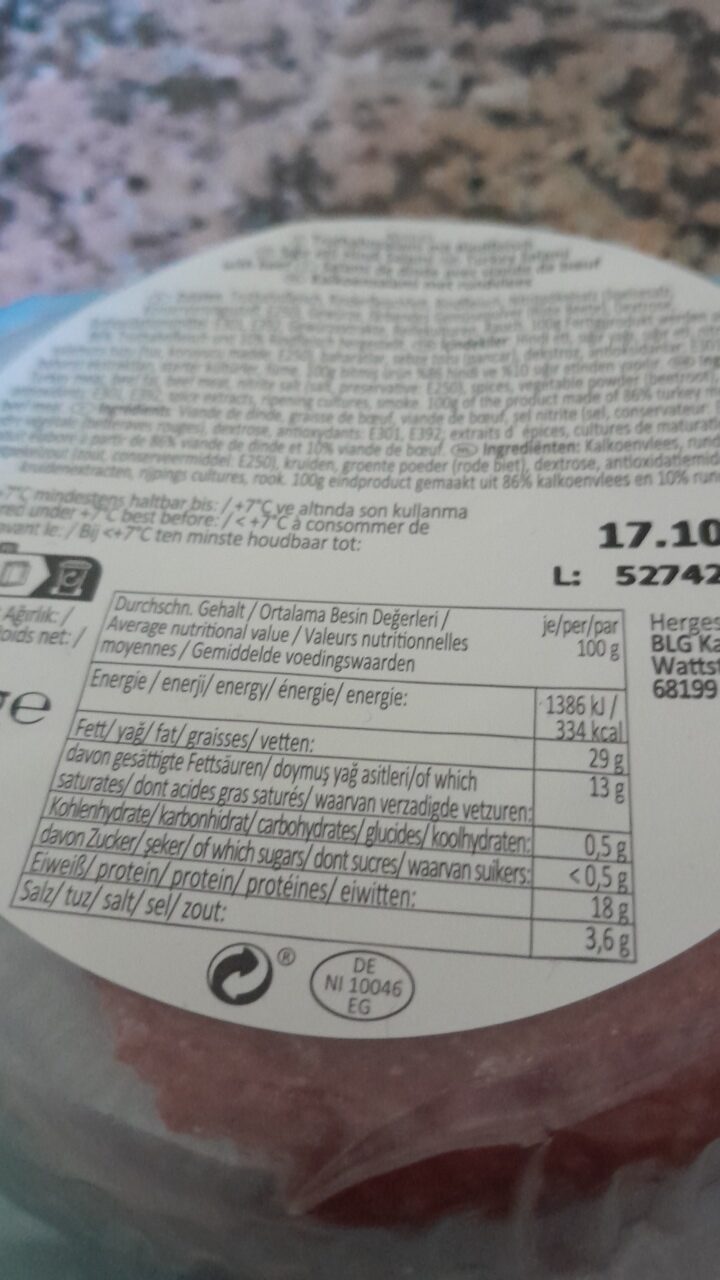
Barcode: 4040328086238
DOUBTFUL
📝 Reason: Several ingredients require source verification for Halal compliance. Without full production transparency, cautious avoidance is advised for observant Muslims.
🏷️ Category: Meat
📄 Certificates: Best Before:, Average Nutritional Value, De Ni 10046 Eg
Ingredients:
Details
Understanding the Halal Status of This Product
In a world where dietary restrictions, especially halal compliance, are gaining increasing focus, it’s essential to ascertain the halal status of meat products. Today, we explore the halal status of our featured product which combines turkey and beef. As per our analysis, this product’s halal status is marked as DOUBTFUL. Let’s break down the reasons behind this classification and delve into its ingredients, including various E-numbers.
Halal Status Overview
The primary concern regarding this product’s halal status arises from a lack of transparent production practices which are critical for ensuring halal compliance. Ingredients such as turkey and beef have varying sources, and unless confirmed halal by a reputable certifying body, caution is advised. The brief explanation indicates that several ingredients require verification of their halal status, signaling observant Muslims to exercise caution in consumption.
Ingredient Breakdown
Let’s examine the ingredients list to understand their halal status thoroughly:
- Turkey: Status 2 – It’s crucial to check for a halal certification logo. Turkey can be halal if sourced correctly.
- Beef: Status 2 – Similar to turkey, look for a halal logo to ensure compliance.
- Nitrite: Status 0 – This additive is permissible in Islam, thus does not affect halal compliance.
- Salt: Status 0 – Salt is a natural ingredient and is permissible in Islam.
- Preservative: Status 0 – Generally accepted as halal if it complies with dietary regulations.
- Dextrose: Status 0 – A sugar derived from starch which is generally acceptable in halal diets.
- Antioxidant: Status 0 – Commonly used for preserving food, permissible in Islam.
- E301 (Sodium Ascorbate): Status 0 – Used as an antioxidant, typically halal as it’s derived from sources approved by dietary laws.
- E392 (Rosemary Extract): Status 0 – Often derived from plants, it is generally permissible.
- Spice Extracts: Status 0 – Typically halal as they are derived from naturally occurring herbs and spices.
- Ripening Cultures: Status 0 – Depending on their source, usually acceptable.
- Smoke: Status 0 – Permissible as flavoring without affecting halal status.
- Beetroot: Status 0 – A root vegetable, naturally halal due to plant origin.
- Herbs: Status 0 – Permissible, typically derived from natural plant sources.
- Vegetable Powder: Status 0 – Generally, vegetable powders are halal.
Conclusion
In conclusion, while many of the ingredients present in this turkey and beef product are permissible in an Islamic diet, the main concern remains the unspecified sources of the meat itself. For Muslim consumers, the absence of a certified halal logo on the packaging implies a risk of consuming non-halal meat. Therefore, it’s advisable to keep informed and, when in doubt, opt for completely verified halal products to ensure alignment with your dietary beliefs.
Final Recommendations
Before making a purchase, always check for halal certifications on meat products. This helps guarantee that the food adheres not just to halal requirements but also to high standards of ethical sourcing and animal welfare.
